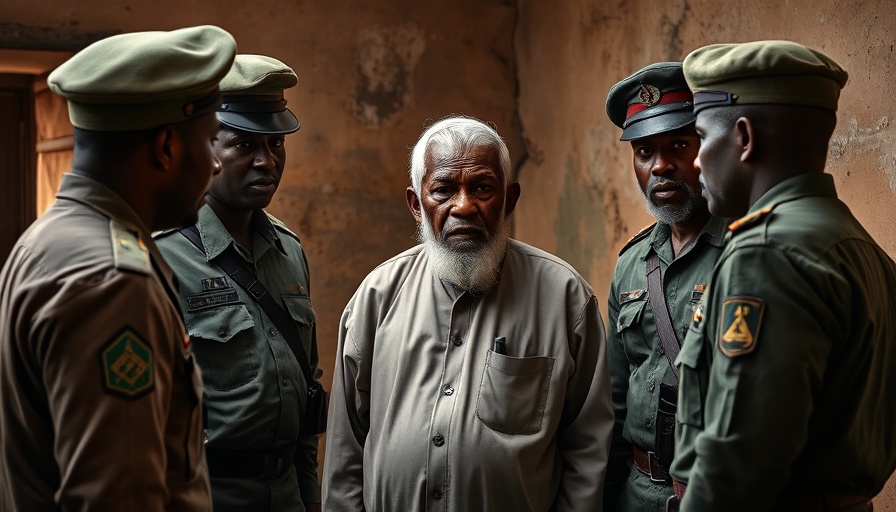
Introduction: A Deep Dive into Banditry in Katsina State
The rising wave of banditry in Nigeria has sparked a myriad of concerns, especially in vulnerable areas such as Katsina State. A recent investigative report uncovered shocking allegations that question the integrity of military personnel in the region. These revelations have ignited discussions about the military's role in the ongoing crisis and the overall security of the nation.
In 'Insecurity: Katsina Resident Expose Nigerian Army Captain Working with Bandits', the discussion dives into the alarming connections between banditry and military operations, prompting a closer examination of the implications for national security.
The Pulse of Banditry: Insights from Katsina
Katsina State, particularly Tanjuni, has become synonymous with banditry. Reports indicate that bandits are increasingly bold, often operating in plain sight, threatening local communities without fear of reprisal from military forces. These revelations, brought forth by journalist Jamil Mabai, highlight a disturbing trend where vigilantes and police are left to fend for themselves against armed groups.
Firsthand accounts from locals paint a grim picture of life under the shadow of armed gangs. The ease with which these groups move around suggests deep-seated issues within the military's operational capacities. Witnesses have reported seeing bandits on motorcycles at night, unchallenged by military personnel often stationed nearby.
Corruption Within the Ranks: A Flawed Military Response
The allegations don't stop at negligence. A retired military major shared harrowing accounts of possible collusion between bandits and members of the military. He disclosed that an informant was apprehended with ammunition, allegedly supplied by a soldier, and after being taken into custody, was released under dubious circumstances. This kind of complicity raises serious questions about the trustworthiness of military forces that are supposed to protect citizens.
The unfolding narrative suggests that the challenges in the military extend beyond mere corruption; issues such as underfunded operations and lack of morale among troops could be exacerbating the banditry crisis. Former Directorate of State Services (DSS) official, Mike O, emphasized the need for thorough investigations to address these troubling dynamics and rid the ranks of corrupt elements.
Challenges Facing the Military: Welfare and Operational Deficiencies
The welfare of military personnel is crucial not only for boosting morale but also for operational effectiveness. Reports indicate that soldiers are deployed with inadequate resources to combat well-armed bandits. This deficiency creates a dangerous cycle where banditry flourishes and military personnel become demoralized due to low support and lack of effective leadership.
Parallel Examples: Banditry and Military Collusion in Global Context
This situation echoes similar global instances where military corruption has fostered a breeding ground for crime and instability. From the Philippines battling drug lords to Latin American countries grappling with cartel violence, the theme of collusion between law enforcement and criminal organizations often underpins these crises. Such parallels suggest that the crises in Nigeria are symptomatic of a broader global issue of governance and accountability.
Public Response: Vigilantes vs. Military
As trust in the military wanes, local vigilante groups are stepping in to defend their communities. While these groups provide immediate security, their rise poses another challenge: a lack of formal training and oversight can lead to further chaos. This complex dynamic calls into question sustainable solutions to banditry in Nigeria, particularly addressing the root causes of insecurity without compromising civilian safety.
Future Predictions: Looking Ahead to Security Strategies
The future of security in Nigeria, particularly in Katsina, demands innovative approaches rooted in accountability and community engagement. Strengthening military preparedness while ensuring transparency can help rebuild public trust. Strategic partnerships between the military and local communities may be a step forward; however, immediate reforms addressing the systemic issues within military ranks are imperative to stem the tide of banditry.
Conclusion: The Path to Resolution
The video report, 'Insecurity: Katsina Resident Expose Nigerian Army Captain Working with Bandits,' shines a spotlight on the pressing dilemma of banditry and military complicity in Nigeria. While the situation may seem dire, acknowledging these challenges is the first step towards devising effective strategies that prioritize public safety. As discussions unfold, it is vital to keep the dialogue going and hold authorities accountable, pushing for reforms that foster genuine security for all citizens in Nigeria.
 Add Row
Add Row  Add
Add 


 Add Row
Add Row  Add
Add 

Write A Comment